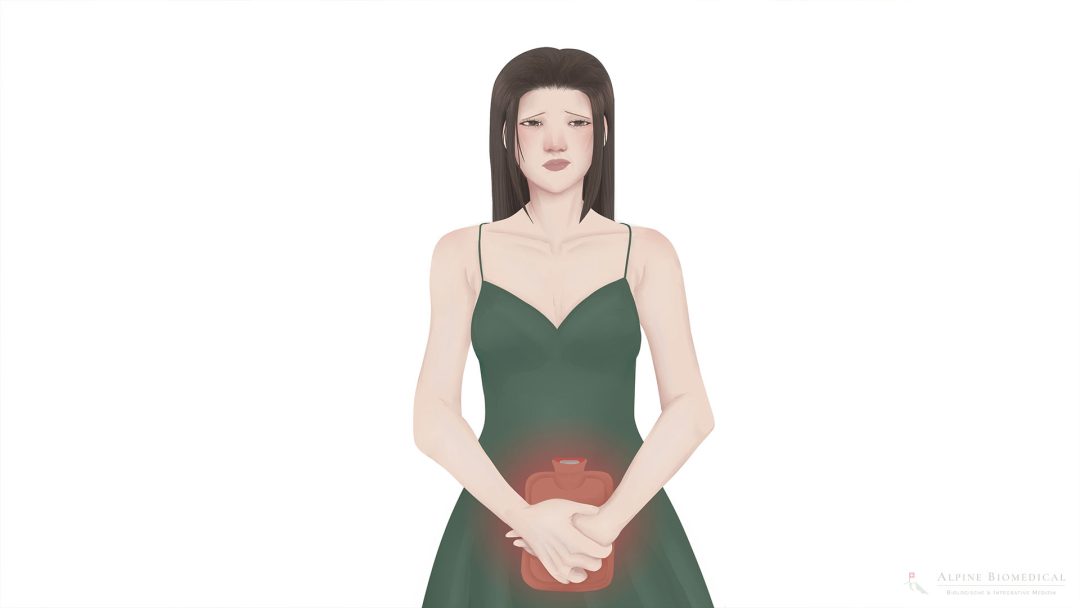PMS - Premenstrual Syndrome

PMS stands for Premenstrual Syndrome.
It describes the occurrence of symptoms such as mood swings, irritability, tiredness, difficulty concentrating and depression shortly before or during your period. Most women of childbearing age show minor symptoms in the premenstrual phase. If there are pronounced changes and severe symptoms, this is referred to as PMS.
PMS is caused by a hormonal imbalance. Here, stress, micronutrient deficiencies and intestinal dysbiosis can also have an influence.
Cause of PMS
Hormonal changes occur during a woman’s menstrual cycle. Our hormones are mainly responsible for regulating our immune systems and they have a close and important connection. If our immune systems are overloaded, this can lead to hormonal disbalances and vice-versa. In the premenstrual phase, the hormonal changes are more pronounced and therefore symptoms can develop. Severe symptoms can be triggered by problems which overload our immune systems, such as the following causes:
- Chronic stress
- Deficiency of micronutrients such as omega-3 fatty acids, vitamin B6, magnesium
- HPU
- Intestinal dysbiosis and intestinal inflammation
- Hidden inflammation (silent inflammation)
- Toxic stress
- Immune disorders and intolerances
This results in a vicious circle of hormonal and immune issues. Therefore, it is essential to have immunological imbalances such as intestinal health, hidden inflammation and possible intolerances checked out properly.
PMS Symptoms
PMS can lead to all of the following symptoms:
- Mood swings and irritability
- Tiredness and exhaustion
- Depression and anxiety
- Difficulty concentrating
- Sleep disorders
- Pain and tightness in the chest and abdomen
- Headaches
- Joint pain and muscle pain
- Digestive problems
- Blemished skin
- Water retention (oedema) in the legs
- Temporary weight gain
The symptoms of PMS negatively affect a woman’s psychological well-being, and the physical pain also makes this worse. Premenstrual syndrome (PMS) is the most common disease of the reproductive organs in women, and it is estimated that numbers are rising each year. Approximately 20% of all women suffer from PMS symptoms. Subsequently, around 5 – 8 % of all women experience severe PMS symptoms, which have a massive negative impact on their quality of life.
PMS Treatment
The treatment of PMS should balance the hormonal imbalances and eliminate the causative factors as far as possible. This requires precise, cause-oriented diagnostics. It is therefore worth having hormone diagnostics carried out around the 19th to 21st day of the cycle in order to rule out imbalances of the hormones. One example is oestrogen dominance, which occurs when the progesterone level is too low and oestrogen is too high. Normally, progesterone helps regulate and balance the negative effects of oestrogen. Therefore, with oestrogen dominance, many health issues can occur. This disbalance should therefore be solved. Micronutrient deficiencies, metabolic disorders, intestinal diseases, hidden inflammations, toxic stress and immune disorders should also be clarified.
Therapy may include the following aspects:
- Administration of vitamin B6, zinc, manganese, omega-3 fatty acids in the case of a proven deficiency or when the person is diagnosed with HPU
- Administration of medicinal herbs and phytotherapeutics, such as lady's mantle, cinquefoil, pasque flower, monk's pepper or yam root
- Balance oestrogen dominance
- Detoxify the body
- Intestinal cleanse
- Treat intolerances and immune disorders
- Treat hidden inflammation
- Minimise factors that cause physical and mental stress. A physical example of stress is CMD.
Med. pract. Dana Hreus M.A.
PMS symptoms can indicate an imbalance in the body. A thorough diagnosis to find the cause and a customised therapy are the key to lasting improvement.

Further information
The information listed contains relevant topics and serves to improve understanding.